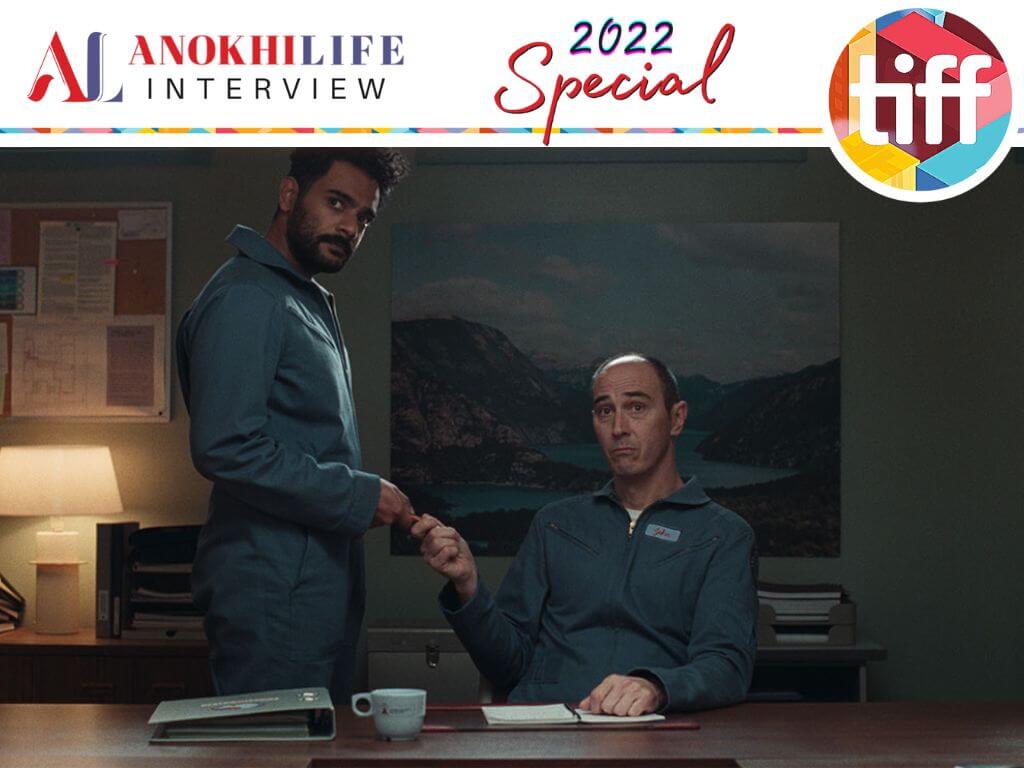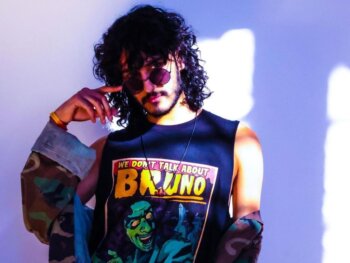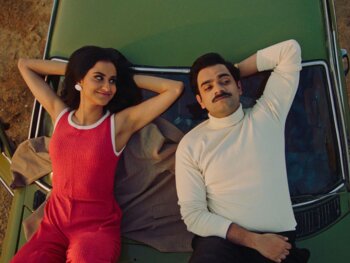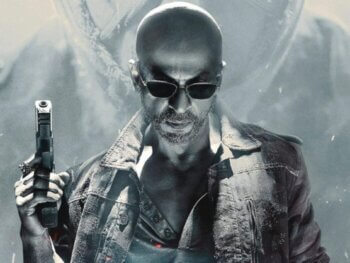The leading man of CTV’s Transplant trades his scrubs for a space suit in this poignant, funny, surreal character study about five average folks selected to spend two years living the lives of astronauts — without ever leaving Planet Earth. During the film’s run at the Toronto International Film Fest, co-star Hamza Haq chatted with us about a unique story that’s “rooted in human weirdness,” the challenge of playing a character who is, himself, playing a character, and why he made it a point to not watch any of the director’s previous work when he landed the part in Viking.
In a grounded yet provocatively surreal character study from French-Canadian auteur Stéphane Lafleur (2014 festival fave Tu dors Nicole), five average citizens are recruited by a space agency to spend two years isolated in the desert, recreating the exact physical and psychological conditions being endured by astronauts who are currently up in space, on their way to Mars. Specifically, each volunteer back on Earth is given a detailed personality profile and daily updates on their corresponding astronaut and expected to mimic them precisely, in the hopes that agency officials can nip any serious stressors or interpersonal conflicts in the bud before they derail the mission. Among those faux spacemen is Hamza Haq, best known to most as the star of CTV doctor drama Transplant. Here, the Canadian actor fills us in on this one-of-a-kind character study, how the film taught him to surrender himself as an actor in a way he hadn’t quite done before and why doing an independent film or two between seasons of his network TV drama is essential for keeping the creative spark alive.
Matthew Currie: How exactly did you come to this project?
Hamza Haq: It came to me. Like most gifts, it just arrived. Earlier last year, we were about halfway through season two of Transplant, and my agent called me and said, “Hey, this guy’s making a movie and he wants to give you a part. It’s in French. He’s a very well-known French-Canadian director, a festival darling . . .” I’d never heard of him . . . He called me and we did a Zoom for about 45 minutes, and I wasn’t convinced. Just because I didn’t know anything about it, I didn’t know the world. Then I went to set on Transplant a day or two later and I asked one of the directors I was working with — we film in Montreal, so everybody knows Stéphane Lafleur there — I was like, “Hey man, have you ever heard of this guy? He offered me a part in his movie.” And he was like, “Man, he hasn’t made a movie in eight years. He’s making another movie?” And unanimously, everybody was like, “Just do it. Don’t worry about what it is, it’s going to be good.”
MC: It’s as if you said, “Hey, there’s this guy Terrence Malick who wants me to be in his movie . . .”
HH: Like, “Paul Thomas Anderson is doing a movie? Yeah, yeah, yeah, just do it. Don’t worry about what it is.” That’s all the convincing I needed. I called my agent later that day and said, “It’s unanimous. I’m supposed to be doing this movie.”
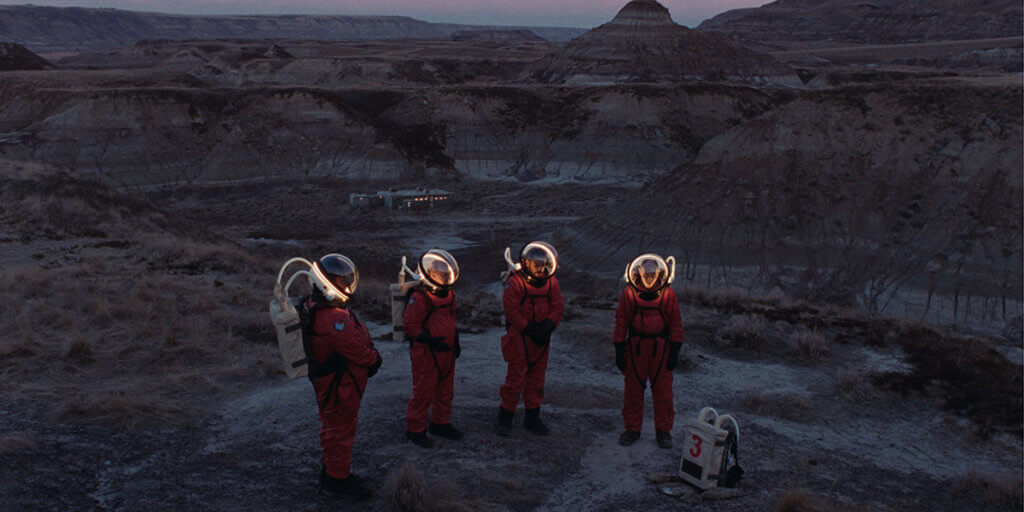
MC: Having now worked with him, what stands out about Stéphane’s style as a writer-director?
HH: He has a very particular vision. His style is beautiful, it’s awkward. It’s so rooted in human weirdness [laughs]. Everything he’s done, it seems outlandish but it’s exactly how people behave, and I love that he leans into that. I didn’t watch any of his work beforehand, I didn’t know any of it before and then after I got cast, I made it a point to not watch anything of his until the movie was completed, because I didn’t want to go into it with [a mindset of], “OK, this is his style,” so I would either consciously or subconsciously try to give him what I think he wanted. So I just went into it fully blind. I’m just going to trust that he knows exactly what he wants. It’s his world. I’ll just go in there, try my best to keep up with the language. And overall, I felt super-safe and listened-to and trusted. He trusted my instincts and just allowed me to play. It was a truly, truly fun experience.
MC: It’s probably true for many film and TV experiences — you only have your own small piece of the puzzle to contribute and you don’t know how it’s all going to be woven together.
HH: Exactly, and working on a network show, going into a third season, I feel like I’ve lulled myself into some false sense of security that I know what I’m doing. We’re on a medical procedural with Transplant, and it’s formulaic and we’ve been working with the same people for almost four-and-a-half years; there’s an expectation that it’s going to go a particular way. Obviously, there are challenges on the day and you have to nuance a performance based on what other people are giving you and you roll with the punches. But you know the arena, so you kind of know what to expect. And even after doing Viking, I was like, “Maybe that’s a bad habit that I’m just building to get through a nine-month production schedule.” Maybe I’m just trying to make it easy on myself by having a template by which I paint these pictures; I liked working on Viking, because . . . I’ve referred to it as an “artistic palate-cleanser.” It was like, “OK, I need to see what I don’t know, so I can add to the arsenal of being in the moment.”
MC: What is the power of the absurd in storytelling. Viking is in many ways a very grounded, humanistic story, but when you add those little hallucinatory moments — with the imaginary astronaut or the floating pen — what does that touch of the surreal add to the experience?
HH: When you are one level removed from your own “reality,” then you do have the ability to show deeper parts of yourself. If we say that it’s kind of absurd or we say that we’re characters playing characters or [questioning] what’s real and what’s not, then there’s a little bit of ground to play with in saying, “I can let the pendulum swing on either side and be the extreme version of whatever I’m experiencing that day.” I can talk to you in an interview and that can be me, but as soon as you put that mask of a character on, I’m actually more free to be myself because I’m more comfortable with that level of removing myself from myself.
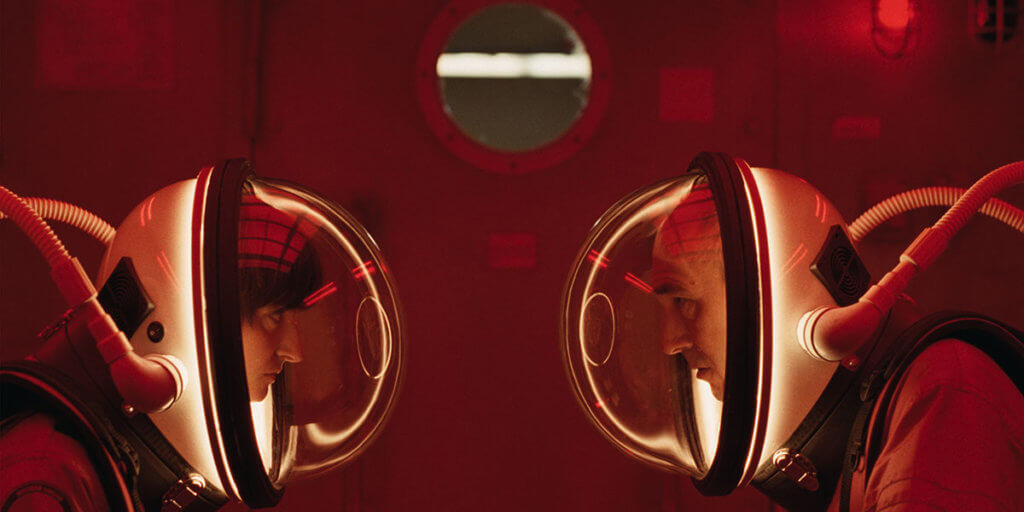
MC: That’s the interesting, almost meta thing about the film: the characters are actually playing other characters, and the identities almost start to merge and flow in and out of each other . . . Did that change your process as an actor?
HH: I was just thinking that my character’s character’s name is “Gary.” So while I’m playing Gary, I felt like the person [playing Gary] was in on the joke, and he was just trying not to laugh the entire time, because he thought it was so silly. But then he starts caring for these people and he becomes attached to these people. And it’s this constant battle of how much do I give of myself vs. what is this job that I’m tasked with? Anytime I struggled with that, I was just like, “Well, what would I do in that situation? Where would I put up walls and where would I absolutely not put up walls? When would I admit it?” The job of the people in Viking Society is that they’re not supposed to talk to each other about those walls. They’re not supposed to know what’s real and what’s not. So I feel that it’s open for interpretation, and I hope that 20 years from now, people are still going to be arguing about who was doing what in Viking [the person or the character they were playing]. I just trusted Stéphane implicitly. There was a good 30 per cent of the movie where it was just a line read, where he was like, “Read it exactly like this.” “You got it, boss!” I had fun with it as well, but there were a lot of times where I just didn’t get it, and he directed me where to go. And I’ve been so hesitant to do that in my career so far because I’m like, “No, I have to author it. I am the architect of my artistry!” But I’m just like, “Maybe I’m not.” It was a really humbling experience. Maybe I’m just here to do my job and serve the story. And if I can’t get it, I need help to do that.
MC: What was it like to put on a space suit. As much as this is a complex, nuanced drama, was there a part of you that was just like, “Holy shit, I’m playing an astronaut!?”
HH: One hundred per cent. I remember my first day on set, we’re in Alberta, it looks like we’re on Mars, wearing these beautiful space suits that the wardrobe team did such a good job with given what they had to work with. They’re just so gorgeous. [A member of the crew] took some pictures of us and sent them to us. And I posted them on Instagram, saying, “Looking for Matt Damon.” We’ve all seen The Martian. We’ve watched Interstellar. There was this one moment, it was five in the morning, we were all getting dressed. It was cold. We were getting ready to film at sunrise. And I just couldn’t stop laughing, because I thought it was so silly. It’s like, “I’m a dad. I’m an adult. I pay bills. And I’m out here in the middle of this desert dressing up like an astronaut pretending to do this thing. That’s my job.” I thought it was so beautiful and so ridiculous that this is what I do for work. I pretend to be a doctor, I pretend to be an astronaut. And the costume element of it, just in a physical, visceral experience, is everything I wanted acting to be as a kid. You put on the black hat and we’re the bad guy. You put on a mask and you’re Spider-Man. I feel like that element of it, it does so much of the work for you.

MC: Now that you’re into season three of Transplant and you’ve spent so long with Bash, has that changed your understanding of your craft, your approach to your craft? Living with a character for years as opposed to doing a couple months and moving on to the next thing . . .
HH: It feels like a relationship. There’s an excitement right at the beginning and then season two is the honeymoon phase where it worked out and we got married and we were accepted by society as a successful show. And then we all went on break and came back [for season three] and it’s like, “OK, what’s next? What’s new?” You have to keep it fresh. You can’t let it get stale, and the only way to do that is work on yourself and continue to nurture yourself and nurture the character and the show . . .
Just like any relationship, you know there’s going to be days where you’re not getting 100 per cent, you know there’s going to be days where you’re just not feeling it, but because you made a commitment, you have to see it through. And there’s a tremendous amount of stamina required. I don’t know how these Grey’s Anatomy people do it, where they’ve been doing the character for nine, 10, 15 years, you know? It’s taxing to do that. I need those independent films in between seasons of Transplant. I’ve done one every year. I did two this year, in between seasons two and three. I need that, to be able to come to it with some level of freshness. That’s my “me time,” my “gentleman’s walkabout” in my relationship with Bash. I don’t know what that says about me as a person . . . But I love acting on such a deep level, I love exploring new parts of myself . . . I love the experience of dedicating myself fully to a character for three months, getting deep in there and then just washing my hands of it.
Main Image Photo Credit: www.tiff.net
Matthew Currie
Author
A long-standing entertainment journalist, Currie is a graduate of the Professional Writing program at Toronto’s York University. He has spent the past number of years working as a freelancer for ANOKHI and for diverse publications such as Sharp, TV Week, CAA’s Westworld and BC Business. Currie ...


















































